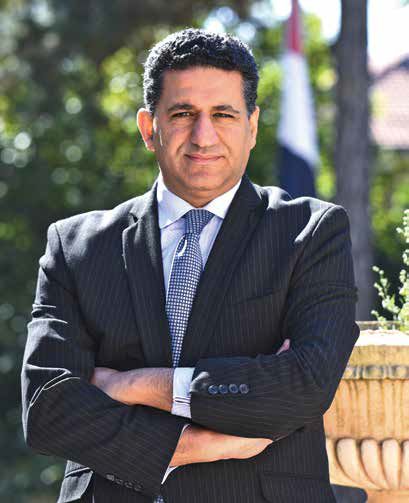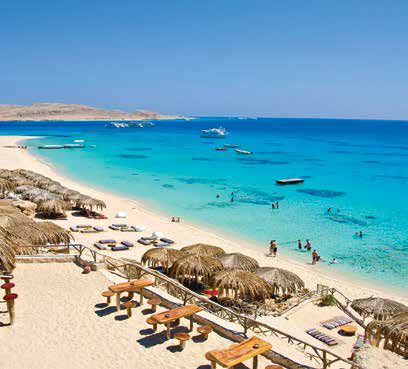Dynamic and optimistic, the new Egyptian ambassador to Serbia kickstarted many cultural and tourist activities in our country. The launch of Hello! Travel: Serbia magazine at Stara Planina gave us a splendid opportunity to talk to him.

After the tumultous events in Egypt in 2011 and later, after so-called Arab Spring, Egypt is now finally stable while the political relations between Serbia and Egypt are developing. How would you assess the relations between Yugoslavia/Serbia and Egypt in the last 50+ years, and especially the last year or two?
— Thank you for the chance to speak for Diplomacy&Commerce, a magazine we have been reading since we came to Belgrade. It is hard to summarise 50+ years but we can actually do that in one word – milestones. This year, we celebrate 110 years of the establishment of diplomatic relations between the Kingdom of Serbia and Egypt. In 1908, Serbian king sent his first ambassador to Africa and the Arab world, and it happened to be Egypt, with the ambassador stationed in Cairo. You see how far our historical ties date. Countries back then were struggling for independence and were formulating its policies. It was the age of independence of nations. So from 1908 onward, the relations continued to grow with the Kingdom of Yugoslavia moving its cabinet and government to Egypt for a couple of months during WWII. Of course, during the period of anticolonial struggle and the formation of Non-aligned Movement, the ties became great, particularly thanks to the friendship between Tito and Nasser. Recently, following all these developments in the Middle East and the Balkans, presidents Vučić and Sissi met in New York at the UN Assembly and agreed to actively improve and enhance bilateral relations. This is one of other milestones
made by two governments to enhance the cooperation, and there is a very solid foundation in history for that. Now, the main aim is to bolster the development of the economic, commercial, cultural and social relations. One of the first things that Serbian citizens think of when they hear the word “Egypt” is tourism and culture. These two things
are basically interconnected since people don’t just go to see beaches, but magnificent monuments too. The Egyptian culture is three-layered: Ancient Egypt, Coptic Christian and Arab Muslim Egypt. Now, after the turbulence in the Arab World the tourists previously refraining from going to the Arab countries are flocking there once again. It is a
great moment to restart the tourist cooperation.
— I agree! Tourism is not only a leisure activity but also a cultural interaction. We have seen the qualitative leap in number of tourists from Serbia in Egypt in the last two years. From 2016 to 2017, there was a 144% rise in the number of tourists. During the first half of 2018, our embassy issued 129% more visas. Considering that the majority
of tourists obtain their visas at the airports, we can expect the same trend there too. Also, in the light of viewing culture and tourism as tied activities, 90% of the Serbian tourists go to the Red Sea Governorate, and its capital Hurghada. We would like to urge travel agencies to include cultural sites close to the sea resorts in their tourist
offers too. Also, we would like to motivate Serbian tourists to visit the oldest monastery in the world, St Anthony, close to Hurghada. When I talked with Pope Tawadros II, the head of the Coptic Orthodox Church, he supported the idea. I would also encourage Serbian tourists to see purely cultural sites, such Cairo pyramids (we call Cairo
“the city of thousand minarets”) and the Hanging Church which is the oldest church in the world, as well as to head down to Aswan and up to Alexandria, on the Meditarranean coast.
It would be great to promote the Mediterranean coast of Egypt as a resort centre, since Alexandria is splendid. There must be resorts in the close proximity of Alexandria, and the sea must be really wonderful.
— Egypt borders two seas – the Red Sea and the Mediterranean – and each of these has its own tourist season. Tourists, who enjoyed coral reefs, the warm still waters of the Red Sea and its orange sands, can easily move during the summer season to the Mediterranean, enjoying the white sandy beaches, turquoise water and waves there. It
is a very different experience. Alexandria is the second largest city in Egypt, just like Novi Sad in Serbia, and we discussed a cooperation between the two cities recently. Alexandria is a real city and a cultural hub with marvellous univeristies and strong industries. I would also like to mention that there is a major ongoing project, implemented
by the government, that entails constructing a brand new city west of Alexandria, 100km to the west to be more precise, called El-Alamein. This city held huge importance during WWII but now it is being developed as a main resort. 100km more to the west lies Ras El Hekma, where I have a beach house. Its name means “The Cape of Wisdom”. I would like to encourage the “sea tourists” to discover the Mediterranean coast of Egypt. We will do everything we can to push this agenda. Also, there are a couple of airports close to the area – Burj Al Arab in Alexandria and Marsa Matruh. The flight from Belgrade to these destinations lasts no more than 2 hours and is much shorter than to Hurghada.

You told me you didn’t have green mountains – even the Mount Sinai is ochre and quite rocky. Can we appeal to Egyptian tourists to come here and see what they don’t have: forests, rivers, do some skiing? We could be the gateway to Europe for the Egyptians.
— I am glad you’ve mentioned it, since tourism is a kind of a cultural two-way street. I would like to encourage
Egyptian tourists to come and enjoy this beautiful country, and to go to places like Stara Planina where we are now. One of the areas that can be of particular interest to the Egyptians is spa and wellness tourism. The combination of
spa and mountain activities could be a winning combination and a wonderful point of attraction.
Vojvodina is flat but also green and fiull of spas and big rivers and it can offer something different to mountain tourism.
— One of the main projects that we are hoping to implement is river cruises. Egypt has a very sophisticated and developed fleet of cruising boats – the Luxor-Aswan is quite famous, and the Aswan-Abu Simbel is also great. There is also a longer line – Cairo-Luxor. I saw the beautiful Sava and Danube rivers, and I noticed one striking similarity
between Cairo and Belgrade. Cairo is where the Nile branches into two main deltas, and Belgrade lies on the confluence of the Sava and the Danube. I call them both “river capitals”. River cruises have a potential and I will be happy to send the highest delegation from our river cruising industry to Serbia, to see the Sava and Danube in particular.
Serbia has recently abolished visas with a number of countries, including China, Iran and India, all resulting in a dramatic increase of foreign tourists from these countries. How about abolishing visas for Egypt? Any news about the mutual abolition of visas?
— I think that is one of the first steps to be taken, since with a visa-free regime or at least a facilitating visa regime, there will be an influx of Egyptian tourists to Serbia. Serbian Foreign Ministry, Tourism Ministry and Economy Ministry could take a creative approach to that issue. That can also bolster doing business, encourage investments
and visits by business people from both countries. Also, Serbia can also become a hub for meetings and conferences; a meeting place for Egyptian and EU business people.
— Tourism is the first and essential step in economic relations, and I am glad to say that, in 2018, we organised the first Egyptian Economic Caravan. In the space of just one week, the Egyptian delegation visited Novi Sad, Niš
and Belgrade twice. You can imagine touring three large cities in one week. We met with all chambers of commerce and the Serbian Chamber of Commerce and Industry and saw an enormous potential for cooperation. We can do even more – Ismailiya, for instance, has one of the biggest folklore festivals and we have never had a Serbian ensemble there, so please try to talk the beautiful Serbian folklore groups into participating next September.
Fantastic! This is an open invitation then. Are they any chances for establishing an educational and technological cooperation?
— I am happy to say that we are finalising the agreement between the ministries of telecommunications and technology from both countries which will do exactly that – bring the two ICT communities together. We met with the Mayor of Niš and this town has the very advanced Faculty of Electrical and Mechanical Engineering. We would be glad if we could connect them with one of the leading engineering faculties in Egypt. We are going to establish more connections both on the academic and technological levels, and also on the intergovernmental level through the Memorandum of Understanding.
You have been extremely active culturally during the past period. This cultural offensive is really impressive. What are you future plans? We are eager to find out more about the countries we know only through TV.
— I see Serbia as an incredibly cultural society. My first impression of Belgrade and Serbia is that the general public here has tremendous appreciation for fine arts, no matter which fine art we are talking about – theatre, music, opera. High culture is almost like popular culture here. I am impressed. It is enjoyed by young and the old, and it’s not elitist. That’s why I thought, well, that Serbians speak mainly Serbian and that Egyptians speak only Arabic. But, in actuality, what we all speak is the language of art: film, theatre, opera, paintings. That is why my main objective during my 7 months’ term is to bring the two peoples speaking one language that we all understand. I arrived here on 16th January and in February, we had the first cultural event with Egyptian participation. We have one major art-related activity almost every two weeks. We have limited resources but have done a lot with them. It is incredibly demanding on HR and finances, but the reception is fantastic – we have a great audience every time! The First Cairo
Opera House came to Serbia for the first time ever this year, despite the fact that our bilateral relations span 110 years. After completing the 15-year-long renovation, the first thing that the National Museum in Belgrade did was to hold a course in Egyptology that focuses on young and older students and amateurs. The course took place
at the Museum of African Art in Belgrade. We had many “firsts” this year. Although, we planned on having an “Egyptian cultural month”, in the end, it turned out to be a cultural marathon.
ARABIC LANGUAGE AND YOUTH ARE THE FUTURE
Arabic is becoming the language of business. Could Serbian people learn more Arabicđ through free courses?
— They are more than welcome to do so! I am impressed by the cultural affinities of Serbian people. The Department of Arabic studies in Belgrade is extremely professional, promoting the very refined classical Arabic and Egyptian dialect. I am happy to invite some of these young leaders to World Youth Forum (WYF) in Sharm El-Sheikh on November 6th. My meeting with Mayor Vučević in Novi Sad was great, since we discussed the cooperation with the European Youth Capital 2019 and European Cultural Capital 2021. I also invited him to be a speaker in Sharm.